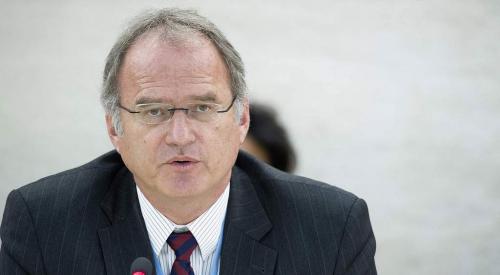Voicing alarm at recent spike, UN human rights experts urge Iran to halt executions
A group of independent United Nations human rights experts expressed alarm at the ongoing spike in executions in Iran, including the recent hanging of a former child bride amid questionable circumstances.

Special Rapporteur on Extrajudicial, Summary or Arbitrary Executions Christof Heyns.
At least 176 persons have reportedly been hanged in Iran this year alone, as part of what appears to be “a steadily increasing rate” since the summer of 2013, the experts stated in a news release. Most of these executions were carried out for drug-related offenses, in violation of international legal provisions limiting the permissibility of capital punishment to the ‘most serious’ crimes.
“The Government continues to execute individuals at a staggering rate, despite serious questions about fair trial standards,” the Special Rapporteur on extrajudicial, summary or arbitrary executions, Christof Heyns, said.
The experts highlighted the case of Farzaneh Moradi, who was reportedly forced into marriage at the age of 15 and was hanged last week in Isfahan Prison after being tried for murdering her husband.
Ms. Moradi originally confessed to the murder six years ago, but later explained that it was carried out by a man who had persuaded her to confess to the crime, convincing her that a young mother would not be executed. The court reportedly would not allow a revision to her original confession.
“In this case, the defendant was reportedly forced into marriage as a teenager and claimed that she was coached into confessing to a crime she did not commit,” Mr. Heyns noted. “Yet the execution proceeded apparently without due attention to these very disturbing circumstances and claims.”
The Special Rapporteur on the situation of human rights in Iran, Ahmed Shaheed, said the “truly alarming” case of Ms. Moradi demonstrates the need for an immediate moratorium on the death penalty in Iran, while stressing serious concern over the provision of due process and fair trial guarantees in this and other cases.
“Ms. Moradi was already a victim before she was hanged,” said Rashida Manjoo, the Special Rapporteur on violence against women, its causes and consequences. “She was a former child bride who apparently could not escape her marriage due to cultural norms and legal barriers to divorce in Iran.
“She appears to have fallen victim to the system once again, this time paying with her life,” she added.
The Special Rapporteur on torture and other cruel, inhuman or degrading treatment or punishment, Juan E. Méndez, added: “The cruelty of this execution in light of an apparent coerced confession is particularly profound and unjust.”
The experts again urged the Government of Iran “to heed to calls by the international community to declare a moratorium on executions.” They expressed shock at the continued surge and at the recent comments issued by Iranian officials claiming that the executions perpetrated by the Government to date are a “great service to humanity.”
Independent experts or special rapporteurs are appointed by the Geneva-based UN Human Rights Council to examine and report back on a country situation or a specific human rights theme. The positions are honorary and the experts are not UN staff, nor are they paid for their work.
Source: UN News
- 353 reads
Human Rights
Ringing FOWPAL’s Peace Bell for the World:Nobel Peace Prize Laureates’ Visions and Actions

Protecting the World’s Cultural Diversity for a Sustainable Future

The Peace Bell Resonates at the 27th Eurasian Economic Summit

Declaration of World Day of the Power of Hope Endorsed by People in 158 Nations

Puppet Show I International Friendship Day 2020

